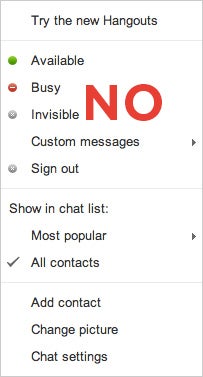It is my opinion that we as a society should ban the use of the “Invisible” status in Gchat—really, in all such chats.
The use of the Invisible status is a sick betrayal of trust and those who perpetrate this betrayal upon their friends and the unsuspecting public will be first against the wall when the revolution comes.

Internet users these days are privileged enough to have a variety of methods available to them for checking email. According to the Pew Research Center’s “Web at 25” study, almost 60 percent of people have smartphones, including 83 percent of 18- to 29-year-olds. This is just one excellent way to check one’s email without subjecting oneself to the attentions of one’s friends.
Another way to check one’s email without having to shoulder the burden of conversation with the people who love you is to check your email while signed out of Gchat.
I have one friend who is never not Invisible. He is a demon sent to torture me, to test my faith in God and humanity, to force me to question my most fundamental assumptions about the nature of love, friendship, and trust. He initiates contact when he wants to. He is a terrible person and I hate him and I never want to talk to him again.
“But Brendan!” I hear you say. “Brendan, what if there are some people I want to chat with and others I would rather not chat with? What if some individuals in the latter category have a tendency to email me whenever I am online? They are needy and obsessive and I do not have the patience or the emotional resources at the moment to deal with them.”
“And Brendan,” you continue, as I listen patiently, nodding, understanding, respecting your perspective. “Brendan. I am very popular and successful. I have many friends and business associates who chat me at every hour of the day for advice regarding their careers and their social lives, who invite me to business functions and brunches, who offer me assignments and dates with their boyfriend’s sister’s friend. It’s too much. It’s just too much.”
Well, I say to you, after having considered your points for an appropriate period of time, well: That’s all a crock of shit and I don’t feel sorry for you at all. Oh, you are shy? Good thing we’re on the Internet and ignoring people is literally the easiest thing you can do. Is this rude? Sure, but it’s also more honest, which is really what we’re talking about anyway. Being a good person on the Internet is all about figuring out the least dishonest way to be sort of rude—Gchat invisibility is both rude and dishonest.
In fact, the good people at Google have anticipated just this situation. They’ve preemptively come up with a solution for you! It’s incredible. It’s genius, really. It’s so simple and great. And it’s just a few pixels away from the Invisible setting.
It’s called: “Busy.”

“Jane is busy,” the Google says. “You may be interrupting.”
Now, no offense to Jane, but she’s probably not busy. Jane is great. She does great things. I love her work. But at any given moment that she is online—even if she is “Busy”—she’s probably not, you know, actually busy. Odds are, if I were to send her a chat message, she’d respond.
But, let’s say she didn’t respond! That’s OK! That’s perfectly OK! Nobody could ever get mad about that! After all, she’s BUSY! (“Busy.”)
The Busy setting gives you a free pass to ignore whomever you’d like whenever you’d like. It’s amazing. It’s brilliant. It’s a lie, but it doesn’t hurt. Everybody plays this game. Everybody uses it. It’s so fine. Because with Busy—unlike with Invisible—everybody is on your level.
Or, if that perfectly reasonable solution is just too simple for you and you need to logistically over-complicate your life, make two different email accounts, one for your work life, one for your social life. People do it all the time! (I don’t, because I’m not a monster, but it can be done.)
“OK,” you say. “Fair enough. I hear what you have to say, and I feel like I am learning a lot about both myself and the world. Thank you for that.”
“But Brendan,” you continue, as I maintain eye contact, “I really just have this one friend who chats me a lot, who is always having all of these ‘problems’ and these ‘questions’ and it’s like ‘get a LIFE already, you weirdo!’ I mean, he’s my friend but, like, come ON, I just can’t be dealing with every little thing that comes up in the course of your DAY, like I have WORK to do. Jeeeesus.”
I pause. This is a reasonable thing! Well, not reasonable exactly, but familiar. We all get impatient with our friends. Even frustrated, sometimes. But using Gchat’s Invisible setting is no way to resolve this frustration. It is a passive-aggressive power play that unduly punishes both the individual who has driven you to this choice AND literally everyone else who might like to talk to you. It’s like burning down the haystack to find the needle. And that was a very good aphorism, well done Brendan, proud of you.
It seems to me that you need to set some b o u n d a r i e s with your friend, maybe have a conversation about what kinds of conversations you are willing to have with them and how often, rather than cloaking yourself in mystery.
When you are invisible in Gchat, you aren’t just hurting your friends. You’re hurting yourself. Because you’re hurting your friends. And then your friends will resent you. And then they won’t want to be your friends anymore. Don’t use the Invisible setting in Gchat. Ban Gchat Invisibility. Ban Gchat Invisibility forever.
Photo via Vaxomatic/Flickr | Remix by Jason Reed (CC BY 2.0)
